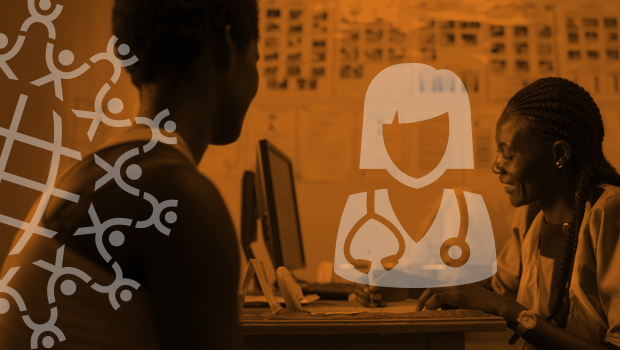Where We Work
See our interactive map


Curiosity and passion drove me to become a physician. Then I realized I needed to learn how to be an advocate too.
I knew I wanted a career in medicine as early as elementary school. My passion was born out of curiosity. My younger brother had recurrent difficulty breathing and needed emergency hospital care often. I wanted to know why these attacks kept occurring. But I also wanted to know why we had to wait long hours to get emergency care and why the hospital had no electricity or was out of medications or essential health care products.
Growing up in such a dysfunctional health care system fueled my passion.
I wanted to help others so they wouldn’t have to go through the same ordeal my family did. I thought being a physician would give me a golden shot at doing this. It was therefore a no-brainer to return to my country, Nigeria, after completing my medical degree in Russia in 2018. I started working in primary care and volunteer medical outreach. I focused as best I could on patient care, despite the many daily hurdles I faced.Being a health worker can be very challenging.
The job of a health worker can be rewarding. Nothing brings me so much joy and fulfillment as seeing clients who come in sick and frail leave the hospital healthy. However, being a health worker can also be very challenging. It’s particularly more challenging in lower-income countries where we must grapple with the lack of equipment, heavy workload due to staff shortages, the absence of professional development opportunities (especially for women), and poor infrastructure, all while still trying to give clients the best care.
The challenges for health workers in Nigeria are enormous. Basic health supplies we need to provide clients care are sometimes difficult to come by. For example, surgical gloves are not readily provided and clients have to buy gloves for health workers—if they don’t provide gloves, we cannot provide them with needed care. Sometimes water and electricity are absent in the hospital and we use our phone flashlights to work at night. The wellness and safety of health workers are not a priority. Working long shifts without breaks is considered the norm. One of my most draining days was when I worked for 48 hours straight without rest. This isn’t uncommon. Some health workers work every day, all year round without days off. It’s an exhausting experience.
Mary Peter is a physician from Nigeria currently pursuing her master's degree in public health from the University of North Carolina at Chapel Hill Gillings School of Global Health. Photo provided for IntraHealth International by Mary Peter.
COVID-19 has exacerbated these challenges and laid bare the wide gap between the value health workers bring to society and the extremely low wages we receive in return. For instance, my salary as a physician in Nigeria was 176,000 naira (about US$400) per month including a 5,000-naira (about $12) hazard pay. This gross underpayment contributes to the migration of health workers from Nigeria to higher-income countries, further worsening the shortage of health workers in the country while increasing the workload for those left behind. A 2021 Guardian article reports that 9 in 10 Nigerian physicians are seeking opportunities abroad. If nothing is done to curtail the mass migration of health workers, there will be a shortage of over 50,120 doctors and 137,859 nurses in Nigeria by 2030.
Working in these conditions is not only detrimental to our health but also to the clients we help.
Like most other health workers, my worst days as a practicing physician have been during COVID-19. At the start of the pandemic, I went through a range of emotions, from fear and frustration to anger over the lack of access to face masks, gloves, gowns, test kits, and other medical essentials. Despite being constantly exposed to COVID-19-positive clients, I never once got tested for the virus because we did not have test kits in our facility. Working in these conditions is not only detrimental to our health but also to the clients we help.
Violence toward health workers is also a recurring theme in health care settings in Nigeria. I experienced this firsthand. In June 2021, armed men stormed the hospital and physically attacked us, destroying hospital equipment and facilities as well. We had to run for our safety. The hospital was closed for almost five months after the attacks.
It’s not just Nigeria experiencing such health workforce challenges and their impact on health services. A new report from the Safeguarding Health in Conflict Coalition shows there were more than 1,300 attacks against health care in at least 49 countries last year. A new study published in The Lancet shows there’s a shortage of 40 million health workers around the world, with the most severe shortages in Africa, South Asia, and the Middle East. Health workers worldwide face similar challenges to varying degrees and need to navigate these hurdles to deliver high-quality care.
I want to learn more about how policies can be used to drive change.
That’s why I’m now pursuing my master’s degree in public health (MPH) at the University of North Carolina at Chapel Hill’s Gillings School of Global Public Health. I want to learn more about how policies can be used to drive change and improve indices and outcomes for underserved and marginalized populations.
And I want to advocate for policies and investments that will provide more support and protection for health workers around the world.
As an IntraHealth-UNC Summer Fellow, I’m researching and documenting key US government and multilateral health workforce policies and commitments to help inform policy recommendations to increase US and global investment and improve policies to support the global health workforce. I’m also conducting outreach and research to identify a list of potential grassroots supporters in the US, including health workers like me, who are committed to strengthening the global health workforce. And I’m learning so much more about the importance of advocacy for health workers and health systems through IntraHealth’s secretariat role for the Frontline Health Workers Coalition (FHWC).
I am encouraged by recent movements, including the US Global Health Workforce Initiative launched last month, as well as health workforce commitments made at the World Health Assembly—but we need to mobilize more advocates to ensure these initiatives and commitments are acted on.
As a health worker from a low-income country who has experienced first-hand challenges, I hope my contribution will greatly affect this cause and help policymakers see reasons to act for health workers.
Get the latest updates from the blog and eNews




